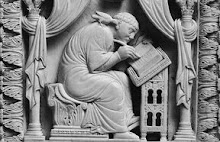"Like alchemy, the roots of counterpoint were centuries old. Ever since the early Middle Ages, when the single chanted line of Gregorian plainsong gave way grudgingly to the presence of another voice, the rich acoustic medium of the medieval stone church had encouraged composers’ experiments writing note against note (punctus contra punctum) and eventually of raiding related vocal lines through one another to form increasingly rich weaves of melody. The most rigorous such part writing, such as canon and fugue, came to be known collectively as learned counterpoint, and its elaborated codes and principles were handed down as carefully and discreetly as the secrets of alchemy, from artifex to artifex (the Latin term for alchemist…
"Just as the alchemist’s ambition was to discover God’s laws for “perfecting” iron into gold, the learned composer’s job was to attempt to replicate in earthly music the celestial harmony with which God had joined and imbued the universe, and in a way to take part in the act of Creation itself…the practice of threading musical voices into the fabric of counterpoint could have been endowed with such metaphysical power."
Evening in the Palace of Reason by James R. Gaines
Friday, February 6, 2009
Subscribe to:
Post Comments (Atom)

No comments:
Post a Comment